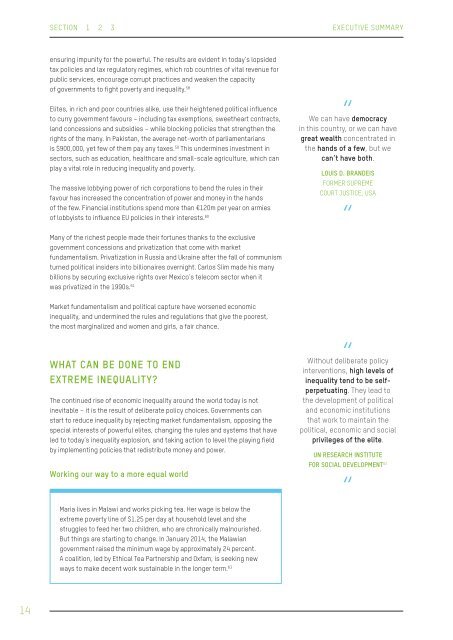1FW2e8F
1FW2e8F
1FW2e8F
Create successful ePaper yourself
Turn your PDF publications into a flip-book with our unique Google optimized e-Paper software.
SECTION 1 2 3 EXECUTIVE SUMMARY<br />
ensuring impunity for the powerful. The results are evident in today’s lopsided<br />
tax policies and lax regulatory regimes, which rob countries of vital revenue for<br />
public services, encourage corrupt practices and weaken the capacity<br />
of governments to fight poverty and inequality. 58<br />
Elites, in rich and poor countries alike, use their heightened political influence<br />
to curry government favours – including tax exemptions, sweetheart contracts,<br />
land concessions and subsidies – while blocking policies that strengthen the<br />
rights of the many. In Pakistan, the average net-worth of parliamentarians<br />
is $900,000, yet few of them pay any taxes. 59 This undermines investment in<br />
sectors, such as education, healthcare and small-scale agriculture, which can<br />
play a vital role in reducing inequality and poverty.<br />
The massive lobbying power of rich corporations to bend the rules in their<br />
favour has increased the concentration of power and money in the hands<br />
of the few. Financial institutions spend more than €120m per year on armies<br />
of lobbyists to influence EU policies in their interests. 60<br />
“<br />
We can have democracy<br />
in this country, or we can have<br />
great wealth concentrated in<br />
the hands of a few, but we<br />
can’t have both.<br />
LOUIS D. BRANDEIS<br />
FORMER SUPREME<br />
COURT JUSTICE, USA<br />
“<br />
Many of the richest people made their fortunes thanks to the exclusive<br />
government concessions and privatization that come with market<br />
fundamentalism. Privatization in Russia and Ukraine after the fall of communism<br />
turned political insiders into billionaires overnight. Carlos Slim made his many<br />
billions by securing exclusive rights over Mexico’s telecom sector when it<br />
was privatized in the 1990s. 61<br />
Market fundamentalism and political capture have worsened economic<br />
inequality, and undermined the rules and regulations that give the poorest,<br />
the most marginalized and women and girls, a fair chance.<br />
WHAT CAN BE DONE TO END<br />
EXTREME INEQUALITY<br />
The continued rise of economic inequality around the world today is not<br />
inevitable – it is the result of deliberate policy choices. Governments can<br />
start to reduce inequality by rejecting market fundamentalism, opposing the<br />
special interests of powerful elites, changing the rules and systems that have<br />
led to today’s inequality explosion, and taking action to level the playing field<br />
by implementing policies that redistribute money and power.<br />
Working our way to a more equal world<br />
“<br />
Without deliberate policy<br />
interventions, high levels of<br />
inequality tend to be selfperpetuating.<br />
They lead to<br />
the development of political<br />
and economic institutions<br />
that work to maintain the<br />
political, economic and social<br />
privileges of the elite.<br />
UN RESEARCH INSTITUTE<br />
FOR SOCIAL DEVELOPMENT 62<br />
“<br />
Maria lives in Malawi and works picking tea. Her wage is below the<br />
extreme poverty line of $1.25 per day at household level and she<br />
struggles to feed her two children, who are chronically malnourished.<br />
But things are starting to change. In January 2014, the Malawian<br />
government raised the minimum wage by approximately 24 percent.<br />
A coalition, led by Ethical Tea Partnership and Oxfam, is seeking new<br />
ways to make decent work sustainable in the longer term. 63<br />
14


